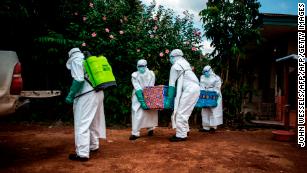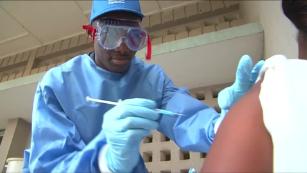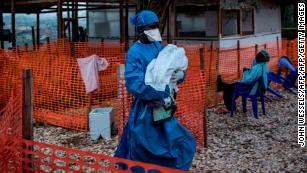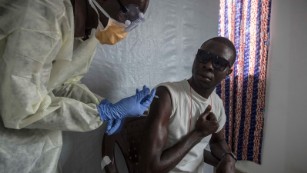MUST READ
Distracting the world from the human rights violations in DRC as
elections near and the installation of a pro-American corporations regime in
DRC :Ebola death toll in DR Congo at 41, new drug in use
https://watchmanafrica.blogspot.com/2018/08/ebola-death-toll-in-dr-congo-at-41-new.html
Divide and Rule:
Balkanizing the Democratic Republic of Congo
https://www.globalresearch.ca/divide-and-rule-balkanizing-the-democratic-republic-of-congo/5642577?utm_campaign=magnet&utm_source=article_page&utm_medium=related_articles
Congo in the Abyss
From Past to Present: Some Historical Truism’s About the Congo
500
Years Is Long Enough! Human Depravity in the Congo
https://www.globalresearch.ca/500-years-is-long-enough-human-depravity-in-the-congo/5641816?utm_campaign=magnet&utm_source=article_page&utm_medium=related_articles
https://watchmanafrica.blogspot.com/2018/08/ebola-death-toll-in-dr-congo-at-41-new.html
Divide and Rule: Balkanizing the Democratic Republic of Congo
https://www.globalresearch.ca/divide-and-rule-balkanizing-the-democratic-republic-of-congo/5642577?utm_campaign=magnet&utm_source=article_page&utm_medium=related_articles
Congo in the Abyss
From Past to Present: Some Historical Truism’s About the Congo
500
Years Is Long Enough! Human Depravity in the Congo
https://www.globalresearch.ca/500-years-is-long-enough-human-depravity-in-the-congo/5641816?utm_campaign=magnet&utm_source=article_page&utm_medium=related_articlesCongo health workers face violence as Ebola virus spreads
Updated 0647 GMT (1447 HKT) November 18, 2018
(CNN)The
death toll from the Ebola outbreak in the Democratic Republic of Congo
continues to rise as violence hampers health workers' efforts to battle
the virus.
There are now 358 cases of Ebola and 213 deaths since the outbreak began in August, according to the nation's Ministry of Health.
Conflict
between militant groups and government forces has made it difficult for
health workers to access some of the hardest-hit areas.
Operations suspended
On
Friday evening, an armed group tried to attack UN peacekeepers in the
city of Beni in North Kivu province -- the epicenter of the outbreak.
The attack occurred near the Ebola Response Emergency Operations Center and hotels where many Ebola health workers are staying, according to the health ministry.
The
peacekeepers were able to push the attackers back after several hours
of clashes but all field activities were suspended in Beni Saturday due
to the violence. The Emergency Operations Center remained closed and
teams had to stay in their hotels.
Earlier
in the week, at least seven peacekeepers were killed and 10 others were
wounded in a coordinated military attack on rebel forces, the United
Nations Organization Stabilization Mission in the Democratic Republic of
the Congo said.
The peacekeeping
outfit has partnered with Congolese armed forces in an operation to
dislodge the rebel Allied Democratic Forces and "restore peace and
stability in the Beni area," the UN said in a statement.
Deadly
violence in the Congo's North Kivu province has hampered efforts to
stamp out the Ebola virus, the country's Minister of Public Health Oly
Ilunga Kalenga said.
Infants among dead
The
outbreak -- the second this year -- began in North Kivu province before
spreading to Ituri province in the east of the country. This is the
10th time since 1976 that Ebola has struck the Congo.
Of
all the reported cases, 311 so far have been confirmed as Ebola and 47
are probable. Among the deaths, 166 are confirmed as having been caused
by Ebola and 47 are probable, according to the nation's health ministry.
Among
those killed in the outbreak are pregnant and breastfeeding women,
newborns and infants, the World Health Organization reported. More than
30 health workers also have been infected, according to the WHO.
Fear of spread
Congo
shares borders with nine nations, and the United Nations fears the
Ebola epidemic could spread to South Sudan as well due to the influx of
Congolese refugees.
Doctors Without Borders
is on the ground in the Congo and has also deployed teams to
neighboring Uganda, though no cases have been confirmed there so far.
Still, the World Health Organization said
Thursday that "the risk of the outbreak spreading to other provinces in
the Democratic Republic of the Congo, as well as to neighboring
countries, remains very high."
Kalenga,
the health minister, posted a video on the Health Ministry's Facebook
page early Saturday calling for communities to be vigilant and report
any signs of illness.
"Community-based
surveillance is at the heart of the new response strategy against
#Ebola. Each inhabitant, at his level, can protect his family and
neighborhood against the virus by reporting any alert and suspicious
cases to emergency teams. All the leaders of the #beni neighborhoods
work alongside us in the response," he wrote.
The virus
Ebola
first appeared in 1976 in Sudan and Congo, and gets its name from a
river in the latter nation. It is one of the world's most virulent
diseases and is transmitted through direct contact with blood or other
bodily fluids of infected people.
Ebola
causes fever, severe headaches and in some cases hemorrhaging. It
spreads through direct contact with bodily fluids or objects
contaminated by someone ill with the disease. In some cases, the virus
is spread through contact with someone who has died from the disease.
The
virus enters the body through broken skin or mucous membranes in the
eyes, nose or mouth. It can also spread through sexual contact.



